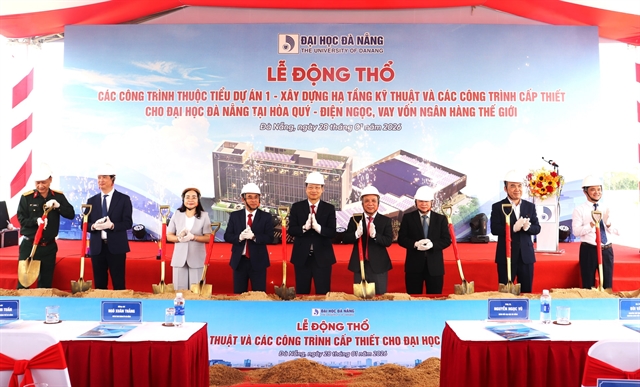 Economy
Economy

 |
| EVN workers inspecting the 220KV Xuân Mai electrical substation. — VNA/VNS Photo |
HÀ NỘI — The amended Electricity Law is expected to address key regulatory hurdles and enhance the operating environment for electricity companies, paving the way for growth and investment opportunities, said experts.
On November 20, the National Assembly passed the amended Electricity Law introducing several new provisions. Vietcap Securities JSC viewed the approval of the amended Electricity Law as a significant and positive advancement for Việt Nam's electricity sector.
One of the major highlights of the amended Electricity Law is the emphasis on market-driven pricing mechanisms for electricity sales, with State regulation to ensure fair competition.
This shift is seen as a positive step towards promoting transparency and efficiency in the electricity sector, ultimately facilitating increased investment in energy infrastructure.
Economist Ngô Trí Long said that the revised law not only fosters a favourable legal framework for market development, but also contributes to the sustainability of Việt Nam's energy sector.
Companies such as Vietnam Electricity (EVN) are expected to benefit from improved financial conditions, thanks to the removal of cross-subsidisation in electricity pricing.
Moreover, the law prioritises the development of liquefied natural gas (LNG) power generation, aligning electricity prices with fuel costs. This strategic move is anticipated to have a positive impact on companies like PV Power as its two power plants rely on imported LNG sources for power generation, said MB Securities (MBS).
The securities firm also expects that the implementation of Direct Power Purchase Agreement (DPPA) between large consumers and electricity producers, initiated in this July, is set to bolster companies involved in power generation. Entities like Power Engineering Consulting JSC 2 (PECC2), Bamboo Capital and Trường Thành Development and Construction Investment JSC are expected to benefit from this regulatory change.
The revised law also streamlines the approval process for investment projects, particularly for electricity transmission lines crossing multiple provinces. This is likely to boost the operation of construction and consulting firms such as PECC2 and PC1 Group, due to increased project volume.
For renewable energy companies facing pricing challenges, the new law is anticipated to provide a more conducive environment by enabling them to secure fair prices for their electricity.
Companies like REE Corporation, Hà Đô Group, PECC2 and PC1 are poised to capitalise on these regulatory adjustments.
Moreover, the amended law streamlines and expedites the process of foreign investors' share ownership, capital contribution and share transfer in offshore wind projects.
On the stock market, electricity stocks showed a muted response on the approval of the revised Electricity Law.
While some witnessed slight declines, others like PV Power and PC1 maintained stability, reflecting the market's anticipation of the positive impacts of the new legislative framework.
Analyst Nguyễn Việt Dũng from MBS suggests that many businesses might not have to wait for directives from the new law to kick-start their investment and operational strategies.
For instance, towards the end of November, PECC2 entered into a collaborative pact using the DPPA model alongside H&M Việt Nam.
Though the DPPA structure is quite new in Việt Nam and could encounter hurdles regarding transmission infrastructure, pricing and agreement intricacies, this signals a fresh avenue for development, lessening dependence on electricity pricing mechanisms and procurement channels from EVN.
This signals that the law has emerged as a catalyst for select enterprises to initiate actions promptly.
Nevertheless, in terms of valuations, Dũng said that there are more enticing stock groups in the market compared to the electricity sector. The valuation within the electricity segment presently is at a reasonably sensible level, considering the outlook for 2025.
The favourable moment for investment hinges on the pricing spectrum of electricity stocks and the chosen investment methodology.
At present, electricity stocks might align better with a dividend strategy, implying that as stocks reach a justifiable range, gradual buying could be considered, Dũng said, adding that companies with more advantageous elements are more inclined to witness price upswings, with REE and Hà Đô Group standing out as two potential stocks which could rise. — VNS




